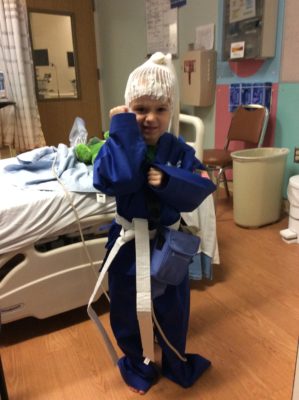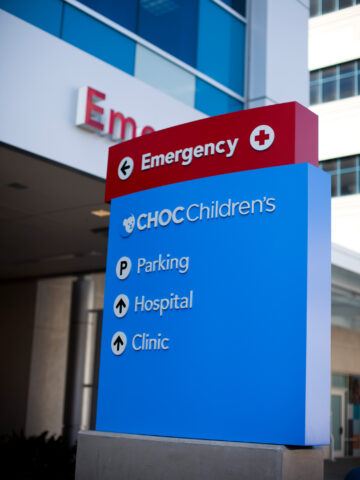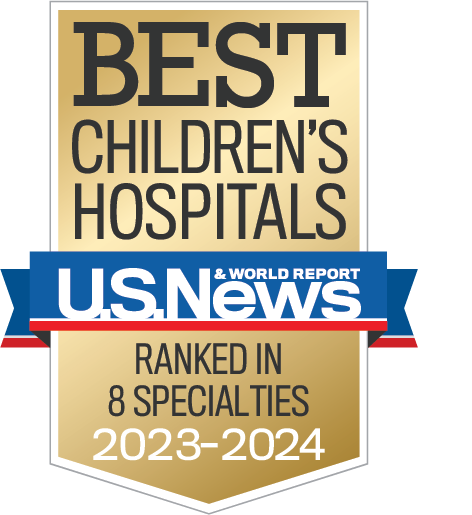Five-year-old Ian Higginbotham recently enjoyed his best summer yet. He experienced his first family vacation. He learned to swim and ride a bike. He got himself ready for kindergarten. These are milestones most kids and parents, alike, eagerly welcome. But there was a time when Ian’s parents weren’t certain their son, who was born seemingly healthy, would enjoy such happy pastimes.
Ian began talking and walking in his sleep as a toddler. When the episodes, including night terrors, increased in frequency and severity, his mom Lisa made an appointment with the pediatrician. One day, Lisa knew something just wasn’t right and didn’t want to wait for the appointment to get Ian checked out. She and her husband Derek took him to the Julia and George Argyros Emergency Department at CHOC Hospital. To her surprise, doctors diagnosed her son with epilepsy. Ian’s “sleepwalking” and “night terrors” were actually seizures.
The family was referred to CHOC’s comprehensive epilepsy program. A national leader in pediatric epilepsy care, CHOC’s comprehensive epilepsy program offers cutting-edge diagnostics, innovative medical approaches and advanced surgical interventions. CHOC was the first children’s hospital in the state to be named a Level 4 epilepsy center by the National Association of Epilepsy Centers, signifying the highest-level medical and surgical evaluation and treatment for patients with complex epilepsy.

Ian’s neurologist Dr. Andrew Mower suspected he was experiencing complex partial seizures, which was confirmed by video EEG monitoring. Complex partial seizures start in a small area of the temporal or frontal lobe of the brain, and quickly involve the areas of the brain affecting alertness and awareness. The pattern of Ian’s seizures suggested they were originating from the right frontal lobe. Dr. Mower knew Ian and his family were in for a tough journey.
“I really don’t think the general public understands the impact epilepsy has on a child and his family. Its effects are multifaceted and extensive. Our team’s goal is to reduce or eliminate our patients’ seizures, helping improve their quality of life,” explains Dr. Mower, who placed Ian on a series of medications.
The medications reduced Ian’s seizures, but did not control them. Dr. Mower was concerned about the seizures affecting Ian’s development, and presented his case to the epilepsy team. The multidisciplinary team agreed Ian was a candidate for epilepsy surgery. For children who fail at least two medications, surgery may be considered early in treatment versus as a last resort. Surgery can result in an improvement in seizure control, quality of life, and prevent permanent brain damage. Ian’s surgery was going to be performed by CHOC neurosurgeon Dr. Joffre Olaya.
While the thought of surgery was frightening to Lisa and her husband, they were confident in the team and comforted to know their son was going to benefit from innovative technology, like the ROSA™ Robot. Considered one of the most advanced robotized surgical assistants, ROSA includes a computer system and a robotic arm. The computer system offers 3D brain mapping to aid surgeons in locating the exact areas they need to reach and planning the best surgical paths. The robotic arm is a minimally invasive surgical tool that improves accuracy and significantly reduces surgery/anesthesia time.
Dr. Olaya used ROSA to accurately place electrodes in the area of Ian’s brain suspected to be the source of his seizures. By using the robot, Dr. Olaya avoided performing a craniotomy.
“ROSA is an amazing tool that yields many benefits for our patients, including less time under anesthesia in the operating room. It reduces blood loss and risk of infections. Patients tend to recover faster than they would if they had craniotomy,” says Dr. Olaya.
Lisa was amazed at the outcome. “I couldn’t believe how great Ian looked after the placements of the electrodes with ROSA. He wasn’t in any pain, there was no swelling. It was wonderful!”
She and her husband were also amazed at how well Ian did following his epilepsy surgery.
“We got our boy back,” says Lisa. “There were no more side effects from medication and, more importantly, no more seizures! He started developing again and doing all the things a child his age should do.”
Ian’s care team isn’t surprised by his recovery.
“Children are resilient, and their brains are no different. In fact, the plasticity of a young brain allows it to adapt to changes and heal more easily than an adult brain,” explains Dr. Mower.
Learning to ride a bike and swim were among the first of many milestones Ian quickly reached following surgery. He enjoys playing with his younger brother and his friends. And, whether inspired by his experience with ROSA or not, Ian loves robots.




